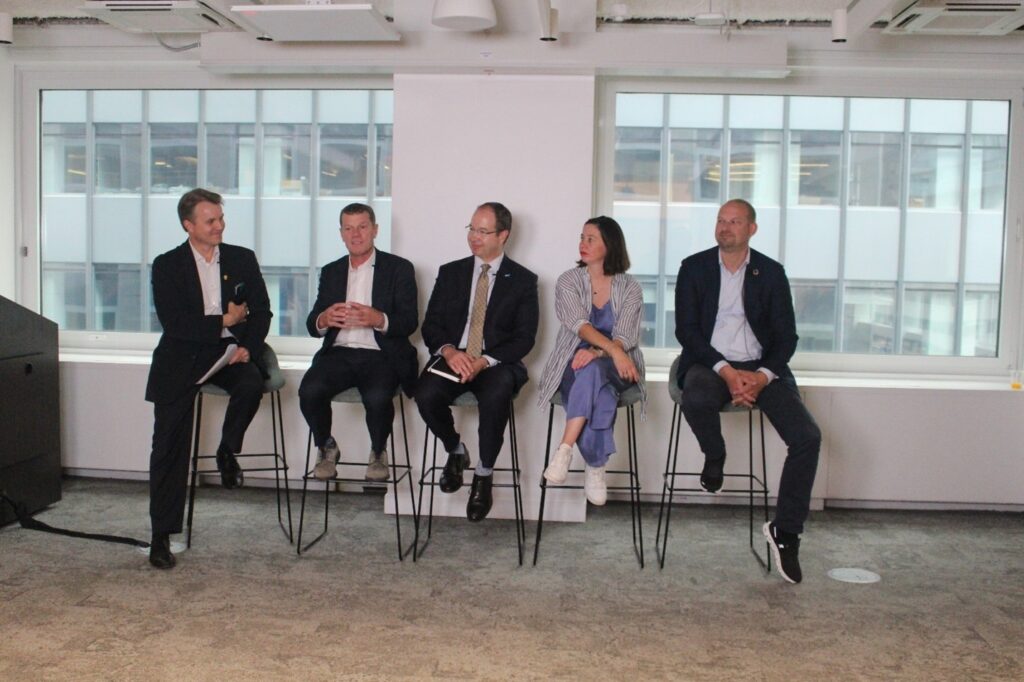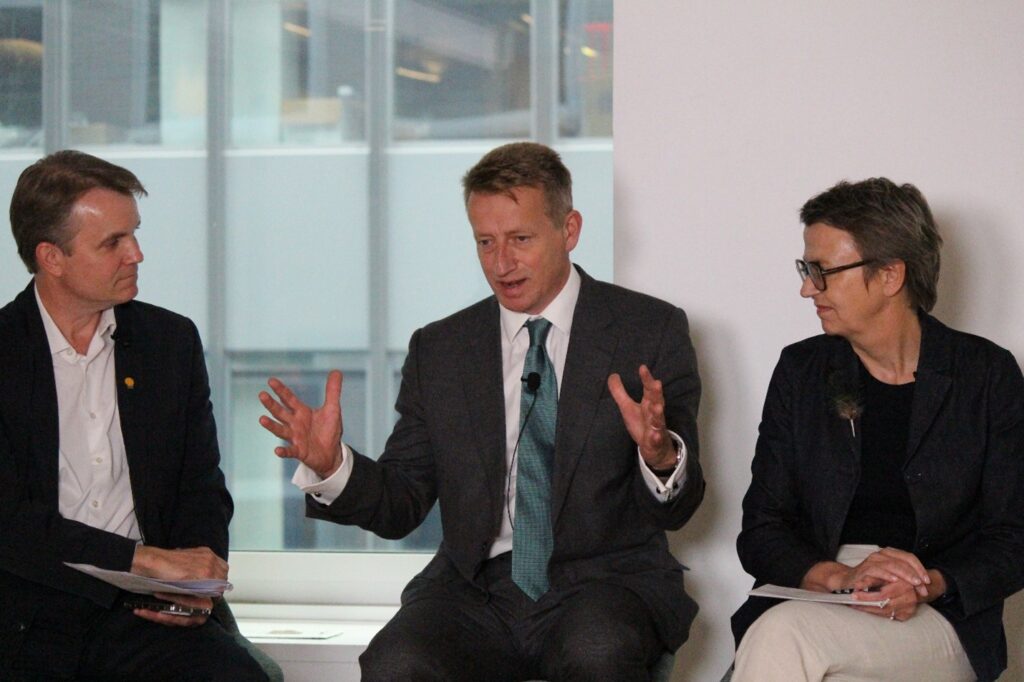
Global Dairy Platform and the Global Roundtable for Sustainable Beef organized an in-person and online side event for Climate Week NYC. The main panel discussion, which focused on innovation, included, from left, Moderator Craig Hanson, Managing Director and Executive Vice President for Programs at World Resources Institute; Dr. Colin South, CEO of ArkeaBio; Jesse Sevcik, Head of Global Public Affairs, Policy and Sustainability for Elanco; Mireille Einwachter, Chief Sustainability Officer for FrieslandCampina; and Mark van Nieuwland, Senior Vice President, Bovaer, dsm-firmenich.
Innovation is vitally important to drive the dairy sector’s continued environmental progress, and Pathways to Dairy Net Zero (P2DNZ) helped showcase it during Climate Week NYC in September.
Global Dairy Platform (GDP) and the Global Roundtable for Sustainable Beef (GRSB) organized an in-person and online side event called “Livestock Tackling the Methane Challenge,” on Sept. 25. Just after that event, GDP participated in “Pastures of Plenty: Sustainable Livestock Solutions for Climate, Nature and People,” which was coordinated by the Advancing Livestock for Climate (Alive4Climate) Coalition, which includes GDP and several NGOs.
In addition, GDP staff, GDP Dairy Ambassadors and executives from member companies discussed environmental progress at multiple other events.
During the GDP-GRSB event, moderator Craig Hanson said now is the time to communicate to governmental leaders, NGOs, consulting firms and other business leaders that livestock innovation and progress on environmental emissions can be seen as a solution.
“We all can play a role in getting the message out,” said Hanson, Managing Director and Executive Vice President for Programs at World Resources Institute. “Get the numbers, tell the story and get ourselves on the agenda.”
Innovation, Sustainability and Scalability
The Innovation Panel at “Livestock Tackling the Methane Challenge,” which featured executives from companies that are P2DNZ supporters, discussed many options and practices worldwide that could help the entire value chain lower its emissions and carbon footprint.
The panel included Dr. Colin South, CEO of ArkeaBio; Jesse Sevcik, Head of Global Public Affairs, Policy and Sustainability for Elanco; Mireille Einwachter, Chief Sustainability Officer of FrieslandCampina; and Mark van Nieuwland, Senior Vice President, Bovaer, dsm-firmenich.

Moderator Craig Hanson, Managing Director and Executive Vice President for Programs at World Resources Institute, talks with Ruaraidh Petre, Executive Director of the Global Roundtable for Sustainable Beef, and Hanne Søndergaard, Deputy Chair, Global Dairy Platform and Executive Vice President, CASO, Arla Foods.
South says his company is working on development of a vaccine for cattle that would cut emissions and be easily administered on farms regardless of their size or situation.
“The challenge is large, but the tools to do it have been developed by biotech industries and
good agricultural scientists over the last 20 to 30 years. Arkea is building on this foundation with a new science plan and committed investors to bring the lowest cost carbon mitigation solution to market” South said.
Van Nieuwland’s company developed Bovaer, a feed additive that reduces enteric methane emissions and can provide a significant and immediate reduction of the environmental footprint of beef and dairy products. For example, just a quarter teaspoon per cow per day reduces methane emissions from dairy cattle by 30% and up to 45%
“We’ve moved from pilots to large scale implementation,” said van Nieuwland, who noted the additive is now available in 67 countries. “We’re moving already to the hundreds of farms, which is a very big achievement. I’m looking forward to scaling this further.”
Sevcick, whose company has secured marketing rights for Bovaer in the U.S., Mexico and Canada, pointed out the importance of measuring emissions reduction and building on the available data to ensure value is delivered. It would also connect value from the marketplace to value from the government space back to the producers, such that the entire chain receives a return. It would also give an innovation company some certainty about the depth of the market, he said.
Einwachter said FrieslandCampina works with its 15,000 farmers in Northwest Europe to ensure they don’t just talk the talk on the environment; they walk the walk, together.
“We’re not there yet, but we’re progressing,” she said. “If you look at our company, we reduced greenhouse gas emissions with our member farmers by 28 percent since 2015. The company is working to help all farmers learn how to best cut their emissions through collaborative outreach.”
She also noted the member dairy farmers of FrieslandCampina received a total of 245m Euros for their sustainability performance in 2023 to incentivize sustainable development
In a conversation that followed, Hanne Sondergaard, Executive Vice President, Agriculture, Sustainability & Communications at Arla Foods, discussed the progress Arla Foods has made in cutting emissions. The company currently uses a points-based system to determine sustainability-focused incentives for farmers. The more points you get, the more money you receive for your milk, she said.
P2DNZ’s Work Reflected in Sessions
In other Climate Week NYC activities, GDP Executive Director Donald Moore was a panelist during the Catholic Relief Services-Farm Journal Foundation UN General Assembly event, where he spoke of the importance of dairy nutrition to feed a growing world population and the progressive work of the dairy industry in reducing its environmental impacts.
In addition, former DFA executive and GDP Operational Committee member Jay Waldvogel discussed Dairy Nourishes Africa and Pathways to Dairy Net Zero on a panel discussion at the “Pastures of Plenty: Sustainable Livestock Solutions for Climate, Nature and People” event. It was organized by the Advancing Livestock for Climate (Alive4Climate) Coalition, which includes ILRI, WWF (US), Heifer International, The Nature Conservancy and the Environmental Defense Fund.
There were more than 600 events covering 10 themes took place in-person and virtually during Climate Week NYC, and GDP also helped organize activities for GDP member companies as well as its Dairy Ambassadors.
The events proved to be an ideal platform to share the dairy sector’s story and put a spotlight on work being done by P2DNZ to accelerate climate action and reduce the dairy sector’s impact on the planet.
You can view an English language or Spanish language recording of the event.